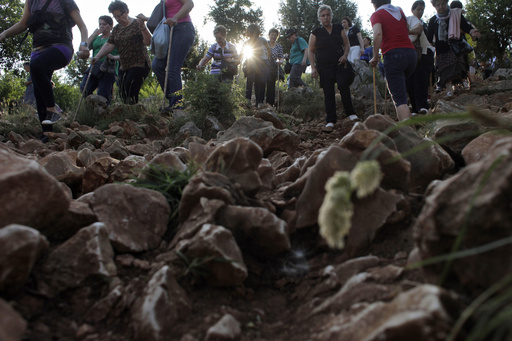The Vatican is finally offering its assessment after nearly 15 years of study on the reported apparitions of the Virgin Mary in Medjugorje, a village in southern Bosnia. The head of the Vatican’s doctrine office, Cardinal Víctor Manuel Fernández, is leading a news conference on this topic. In 1981, six children and teenagers claimed to have seen visions of the Madonna on a hill in Medjugorje, leading to the village becoming a major pilgrimage site for Christian believers. While millions visit Medjugorje annually, the Vatican has never authenticated the alleged apparitions, unlike other Catholic sanctuaries like Fatima or Lourdes.
Local bishops and Vatican officials have questioned the credibility of the visionaries over the years, suspecting economic motives behind their ongoing claims of visions. Religious tourism has significantly boosted the economy in the surrounding area since the devastation caused by the Bosnian war in the 1990s, with hotels, accommodations, and other businesses catering to pilgrims. Speculation is high regarding the Vatican’s forthcoming announcement, especially considering the language used in the briefing, focusing on “the spiritual experience of Medjugorje” rather than the apparitions.
Pope Francis established a commission in 2010 to investigate the reported apparitions, with a specific emphasis on differentiating between the original visions in 1981 and the subsequent claims of ongoing apparitions. While casting skepticism on the continuous visions, Pope Francis acknowledged the positive impact that Medjugorje has had on visitors spiritually. The Vatican has since established new criteria for evaluating alleged supernatural events, aiming to protect believers from exploitation while allowing for expressions of devotion if the reported events align with Catholic faith.
The outcome of the Vatican’s assessment on Medjugorje is eagerly anticipated and is expected to influence the village’s significant role in Christian pilgrimage and the local economy. Medjugorje is crucial for the development of the municipality of Citluk, with tourism playing a vital role in its economic well-being. Officials predict a potential surge in visitors in 2024, as pilgrims seek alternatives to destinations like Israel due to ongoing conflicts. Medjugorje is described as a vital growth catalyst for the entire area, with various Christian events and festivals drawing humanitarian organizations to the region.
